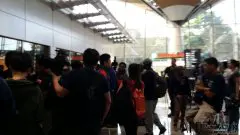The first batch of graduates getting their bachelor's degrees at Pyongyang University of Science and Technology (PUST) are ready to leave campus Wednesday and embark on a new chapter of life.
As the only private international university and the first college co-founded by the Democratic People's Republic of Korea (DPRK) and the Republic of Korea, PUST is devoted to cultivating students with both a command of professional knowledge and a global vision. All lectures are given in English and students are able to access the Internet to search for necessary academic materials.
At a grand commencement held Wednesday, 22 students out of the 99 undergraduates were selected and honored as "outstanding graduates" for their exceptionally brilliant performances.
After delivering an encouraging speech congratulating on the graduates' academic success, President Pak Sang Ik conferred a certificate of merit issued by the DPRK's education commission upon each of these 22 graduates.
Chinkyung Kim, a South Korean American and also founding president of PUST, followed with a short English speech.
Yet he decided to speak in his mother tongue when it comes to expression of his deep love for the fatherland and sincere thanks to the supreme leadership without whom the plan for building PUST would never come into reality.
Concluding the speech, he chanted "Thank you!" in Korean, French, German and English.
Dean of the foreign language department, Mitchell Judith Helen, gave a witty yet inspiring speech, triggering waves of laughter from the audience.
More than 30 professors from Britain, the United States and Canada are teaching here, making it indeed an internationalized university.
Yoon Chol Il made an emotional address at the commencement as a representative of the outstanding graduates.
Speaking in an exciting tone, he extended gratitude to leaders of the country, the university and the professors, and pledged to make contributions to his fatherland.
Yoon later showed Xinhua his graduation and degree certificates.
The degree certificate was printed in English. On the transcript handed over along with the graduation certificate were 44 courses in all, with three of them on the revolutionary history of late and current leaders, Kim Il Sung, Kim Jong Il and Kim Jong Un.
Yoon got up at 6:30 a.m. and usually studied till midnight, in library or dormitory.
Jang Ryong Jin, an official of foreign affairs office, said that foreign professors were impressed by the hard-working students.
During the spring and winter vacations that each last for a month, the students usually go back home and spend the holidays with their families.
"They were recruited from all over the country, not only from the capital city," said Jang. "The school also offered them opportunities to go out of campus for an internship at a factory or on a farm."
PUST also has a graduate school. About 60 students are seeking master's degrees at the school and they are given opportunities to study abroad for a short period of time.
In May, the school sent off the first group of graduate students who had finished their studies.
"Some of our graduate students are now studying abroad at top universities," Jang said. "Those world-renowned universities speak highly of our students, especially for their urge to learn and painstaking effort."
The undergraduates must have a good knowledge of the English language before they are admitted to PUST, as they are required to take an extra English proficiency exam.
"Isn't it difficult to learn science in English, which is a foreign language for you?" a Xinhua reporter asked Yoon.
"At the very beginning it was a bit hard, but as time went by, I got used to it and it was no longer that difficult to me," he said in confidence.
The 24-year-old agriculture and life sciences major said he will continue to study at the PUST graduate school for a master's degree and after that he will probably choose to become a researcher.
PUST, located in the Rakrang district on the outskirts of Pyongyang, was opened in October 2010. The project was initiated in 2002 and promoted through joint efforts of the DPRK Education Ministry and the Northeast Asia Foundation for Education and Culture in Seoul.
 简体中文
简体中文

